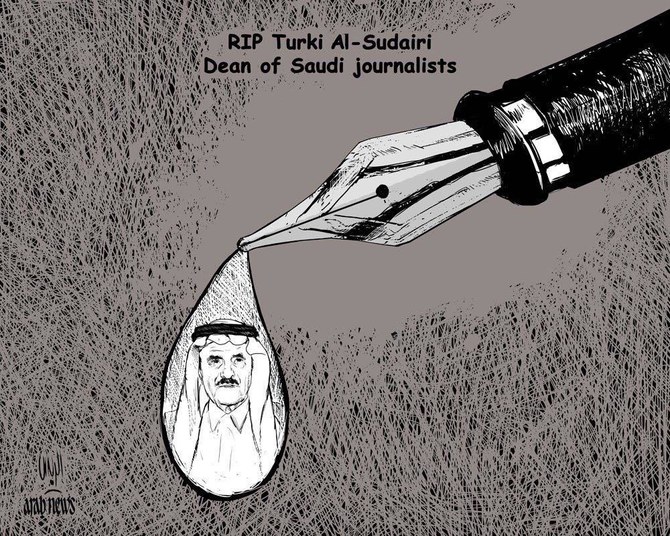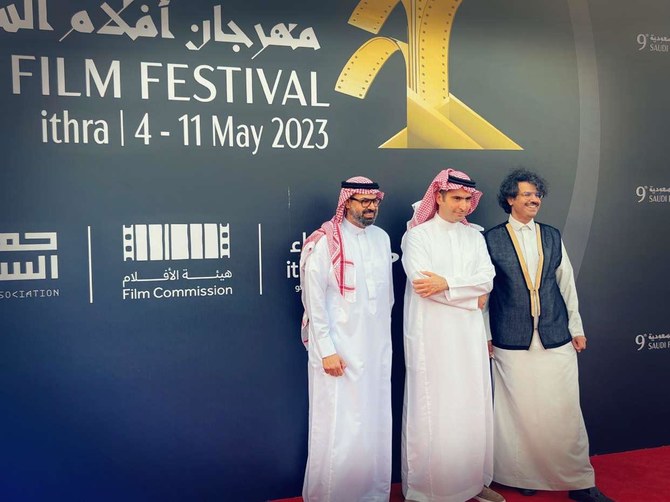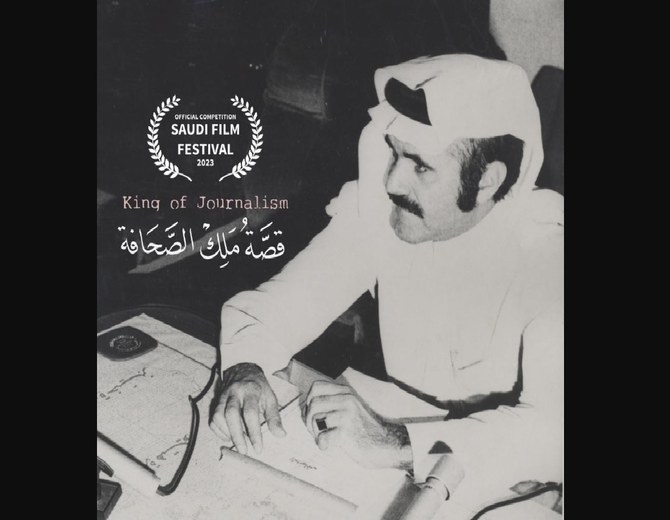DHAHRAN: The life of esteemed Saudi journalist Turki Al-Sudairi has been memorialized in “King of Journalism,” a documentary that premiered at the Saudi Film Festival at Ithra this week.
Turki Al-Sudairi, a pioneer of journalism in the region, had a career that spanned decades and earned him widespread recognition. The documentary’s title, “King of Journalism,” is a nod to the appreciating words of the late King Abdullah.
Al-Sudairi worked for more than four decades in the Kingdom’s media industry. He began his career as a sports journalist for the Al Riyadh newspaper, then became involved in other areas of reporting, making his way up to managing the paper as deputy chief editor and later as chief editor.
His passing impacted journalists around the world. Ali Saeed, a former Al Riyadh journalist, was so moved by the loss that he decided to team up with his twin brother, Hassan Saeed, to direct and produce a documentary on Al-Sudairi.
“Ali used to work in Al Riyadh newspaper for many years. When he became a full-time filmmaker, he decided to make a documentary about the inspirational Turki Al-Sudairi,” Hassan told Arab News.
For more than two years, the pair conducted meticulous researched and worked on their project. A critical aspect of that process was finding archives of Al-Sudairi’s work. Hassan added: “Al Riyadh newspaper and SRMG helped us with the archive. It was really a journey.”
Mazen Al-Sudairi, the son of the late journalist, was featured in the documentary. He told Arab News that he was proud of the film, which “tells the true story” of his father’s life.
He said: “The idea is to give the story an objective image and give the audience the chance or the space to judge his actual trial as a leader, as a journalist and as a writer.
“He was editor-in-chief for 40 years, from 1974 till 2015. So many changes have happened in society, economy and geopolitics. This gives you a story of an era, not just of a man.”
While filming the documentary, the producers took care to replicate Al-Sudairi’s daily routine and added a layer of authenticity by filming in his workplace and including a docudrama scene.
Hassan said: “Every location in the film is the actual location with an actor who came to play the role of Turki Al-Sudairi … we filmed at his actual office in Al Riyadh office and home office.”
The Saeed brothers said they will continue on the path of creating documentaries on important figures.
“We are also working on a few ideas for the future, but this focus is really important for the industry right now. Just to focus not on only narrative films, but also to focus on documentaries.”
‘King of Journalism’ premieres at Saudi Film Festival
https://arab.news/9rtxx
‘King of Journalism’ premieres at Saudi Film Festival

- Turki Al-Sudairi, a pioneer of journalism in the region, had a career that spanned decades and earned him widespread recognition
- His passing impacted journalists around the world
‘Cake not hate’ campaign becomes ‘Dates not hate’ in Madinah

- Dan said he was very impressed by Saudi hospitality and that his family was warmly welcomed
- He said being in Madinah exposed him to the true diversity of Islam
LONDON: A British autistic and non-verbal boy who has been visiting UK mosques and distributing cakes to promote solidarity amid an increase in far-right support in the country has taken his message of love to Madinah.
Joshua Harris, or “The Joshie-Man” as the 12-year-old is known to his social media fans, has handed out hundreds of his baked goods to worshipers at mosques in major British cities over the last few months.
The “Cake not hate” campaign came about after an Islamophobic attack on a mosque in his home city of Peterborough in October 2025.
Harris and his father visited Masjid Darassalaam, the mosque that was targeted, with cakes that the boy had baked and distributed them to the congregation soon after the attack. Since then, Harris has visited dozens of mosques in the UK.
On a recent trip to the Middle East, he and his father visited Madinah. In a local twist that pays tribute to the holy city’s famous date varieties including ajwa and ambar, Harris handed out dates to people in the courtyard of the Prophet’s Mosque. The “Cake not hate” campaign became “Dates not hate” for Saudi Arabia.

“He was greeted really, really warmly. There were some really touching moments where people were kissing his hands and his head. It was really lovely,” his father, Dan Harris, said.
Dan, the founder of global charity Neurodiversity in Business, said being in Madinah exposed him to the true diversity of Islam.
“We met people from all around the world. It was amazing. It’s like the United Nations there, you get people from different countries and it just goes to show you that the Muslim community, or the Ummah more generally, is not a homogeneous group,” he said.
“We saw people from Tajikistan and Uzbekistan and it was really interesting for us.”

Dan said his visit to Madinah, considered the second holiest city in Islam after Makkah for Muslims, was “profound and life-changing.”
He added: “I would say it’s my favourite city in the world due to the peace and tranquillity I felt there.”
Dan added that he was very impressed by Saudi hospitality: “Everywhere we went, people were taking down my number and insisting that we come for dinner, insisting they pick us up from the location. They were extremely attentive to Joshie as well, making sure his needs were met. We felt a great sense of welcome, something Saudi Arabia is known for.”

















